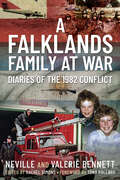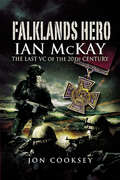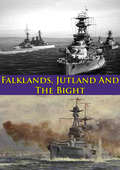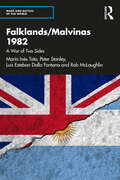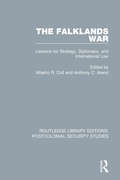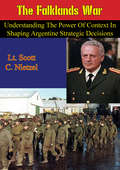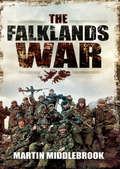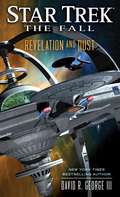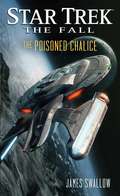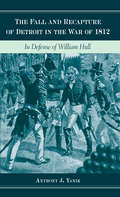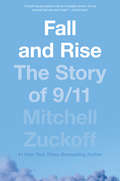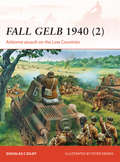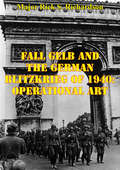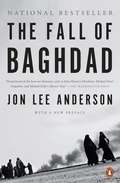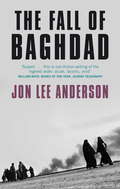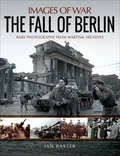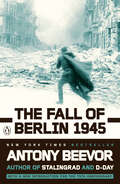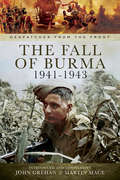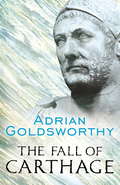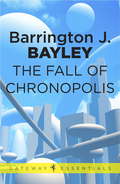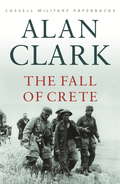- Table View
- List View
A Falklands Family at War: Diaries of the 1982 Conflict
by Neville Bennett Valerie BennettMany military accounts of the British side of the Falklands War have been published as well as memoirs written by servicemen who took part, so this aspect of the story of the Argentine occupation and the British liberation of this remote territory in the South Atlantic is well known. But little attention has been paid to the Falkland islanders who had direct personal experience of this extraordinary crisis in their history. That is why the previously unpublished diaries of Neville Bennett and his wife Valerie, a fireman and a nurse who lived with their two daughters in Port Stanley throughout the war, is such vivid and revealing reading. As chief fireman Neville was frequently called out to deal with fires and other incidents during the occupation, and each day he recorded what happened and what he thought about it in his sharp and forthright way. Valerie saw a different side of the occupation through her work at the Stanley hospital where she had to handle the Argentines as well as daily accidents and emergencies. Their joint record of the exceptional circumstances in the Falklands in April, May and June 1982 gives us a fascinating inside view of family life during the occupation and of their relations with the Argentine soldiers and commanders. It is engrossing reading.
A Falklands Family at War: Diaries of the 1982 Conflict
by Neville Bennett Valerie BennettMany military accounts of the British side of the Falklands War have been published as well as memoirs written by servicemen who took part, so this aspect of the story of the Argentine occupation and the British liberation of this remote territory in the South Atlantic is well known. But little attention has been paid to the Falkland islanders who had direct personal experience of this extraordinary crisis in their history. That is why the previously unpublished diaries of Neville Bennett and his wife Valerie, a fireman and a nurse who lived with their two daughters in Port Stanley throughout the war, is such vivid and revealing reading. As chief fireman Neville was frequently called out to deal with fires and other incidents during the occupation, and each day he recorded what happened and what he thought about it in his sharp and forthright way. Valerie saw a different side of the occupation through her work at the Stanley hospital where she had to handle the Argentines as well as daily accidents and emergencies. Their joint record of the exceptional circumstances in the Falklands in April, May and June 1982 gives us a fascinating inside view of family life during the occupation and of their relations with the Argentine soldiers and commanders. It is engrossing reading.
Falklands Hero: Ian McKay–The last VC of the 20th Century
by Jon CookseyAt the height of the bitter battle for Mount Longdon during the Falklands War , 3rd Battalion, Parachute Regiments assault has stalled in the face of determined resistance. With his platoon held up by an Argentine machine gun, it falls to Sergeant Ian McKay to act. The machine gun has to be silenced to break the deadlock. Gathering a small group together, Ian McKay leads them in a headlong dash into the teeth of a withering fire. One by one they fall until only McKay is left, charging on alone towards the Argentine gun and a place in history. His was the final act of a man who lived, breathed and was shaped by the Parachute Regiment: an act which earned him a posthumous Victoria Cross. This is the story of Ian McKay: the last British hero of the Twentieth Century.
Falklands, Jutland And The Bight [Illustrated Edition]
by Commander The Hon. Barry Bingham V.C. R.N.At the outbreak of the First World War, Barry Bingham, an Ulsterman and career sailor who joined the Royal Navy in 1895, was a Lieutenant-Commander gunnery officer on the new battlecruiser HMS Invincible.He and his men did not have to wait long before they were pitched into battle against the German fleet, Invincible was part of the taskforce sent into the South Atlantic to avenge the defeat at the Battle of Corondel. The ensuing battle of the Falkland Islands was a decisive encounter, the lighter German Squadron under Admiral Graf Spee were surprised by their British opponents and lost all but two of their ships.The author's reward for his conduct was command of a destroyer squadron in the Home Fleet and in May 1916 at the Battle of Jutland he was to win the Victoria Cross. He was ordered along with six other destroyers, along with the three of his squadron, to attack Admiral Hipper's battlecruiser squadron. Out-ranged and out-gunned, Bingham's ship drove for his target hard and fast, hoping to come within torpedo range of the heavier German ships. The German destroyer screen intercepted the majority of the British ships, of which two were sunk and others disabled; Bingham in HMS Nestor along with HMS Nicator of his squadron plowed forward. With reckless bravery the two ships carried on to 3,000 yards but were disabled before they could release their torpedoes; the Nestor continued to fight the unequal battle until sunk., Bingham and many of his crew were picked up a German destroyer bound for captivity warmed only by the thought that they had done more than their duty.
Falklands/Malvinas 1982: A War of Two Sides (Wars and Battles of the World)
by María Inés Tato Peter Stanley Luis Esteban Dalla Fontana Rob MclaughlinAfter four decades from the 1982 war between Britain and Argentina over possession of the Falklands/Malvinas islands in the South Atlantic Ocean, this book allows for a new and rounded reading of the causes, course and consequences of the war. It provides a comprehensive overview of the Falkland/Malvinas War by integrating the military history of the conflict into the diplomatic, political, social and cultural aspects of the war. Including a substantial body of advocacy, chronicle, narrative and analysis, the volume draws upon an extensive range of published sources, in English and Spanish, primary sources from both sides and unpublished testimonies. The book, written by Argentine and Australian historians and scholars, discuss themes such as the background to the war, the offensive campaign for the islands and the English and Argentine experiences and memories of the war from the perspective of the islanders. Being part of the Wars and Battles of the World series, this book will be an essential read for scholars and researchers of military history, British history, Latin American history, defence and strategic studies, geopolitics and modern history.
The Falklands War: Lessons for Strategy, Diplomacy, and International Law
by Alberto R. Coll and Anthony C. ArendFirst published in 1985, The Falklands War was the first comprehensive work of its kind. The book brings together a wealth of work by scholars and practitioners in the fields of diplomacy, military affairs, and international politics and law. It provides a comprehensive and objective overview of the Falklands War and the underlying crisis that continued following it. This volume is a detailed study suitable for anyone wishing to expand their knowledge of the Falklands War.
The Falklands War: Understanding the Power of Context in Shaping Argentine Strategic Decisions
by Lt. Scott C. NietzelThis thesis uses a historical case study approach to examine the impact of context on shaping decision making during the conduct of war. The case analyzed is the war between Argentina and Great Britain for control of the Falkland Islands in 1982. This thesis examines the relative strength of the belligerents' positions using the concepts of force, time and space from current operational warfare doctrine and shows that British victory in the conflict was by no means a foregone conclusion. Next, an exploration of Argentine conduct of the war highlights and discusses in detail mistakes and errors in judgment that had direct impacts on battlefield results. These decisions are then traced to the context in which they were made. It is this context, specifically the power of limited war culture and to a lesser extent the strength of the military polity as a constituency, that explains the Argentine defeat in the Falklands.
The Falklands War (Penguin Classic Military History Ser.)
by Martin MiddlebrookA detailed history of the brief 1980s conflict between the UK and Argentina, from the author of The First Day on the Somme. With the surprise Argentine invasion of the remote Falkland Islands on April 2, 1982, the United Kingdom found itself at war. Due to the resolve of a determined Prime Minister and the resourcefulness of the Armed Forces, a task force, codenamed Operation Corporate, was quickly dispatched. Remarkably, just over two months later, the islands were liberated, and the invaders defeated. By any standards this was an outstanding feat of arms, cooperation made possible by political resolve, sound planning, strong leadership and the courage and determination of the British forces. Martin Middlebrook, the renowned military historian, has skillfully weaved the many strands of this extraordinary achievement into a fascinating, thorough and highly readable account. Thanks to his meticulous research he covers action at sea, on the land and in the air as well as providing the strategic overview. The author&’s use of many first-hand accounts reveals what it was like to be part of this audacious military endeavor. The experiences of the Falkland Islanders during the Argentine occupation are also included. Thirty years on, Middlebrook&’s The Falklands War is still an authoritative and thoroughly readable account of this historic enterprise.Originally published as Operation Corporate: The Story of the Falklands War, 1982.Praise for The Falklands War&“The author&’s descriptions of confrontations in the air, on the sea and on the various battlegrounds are superb, as are his explanations of the use of new weapons, such as the Sea Harrier and the Exocet missile.&” —Publishers Weekly
The Fall: Revelation and Dust (Star Trek: The Fall)
by David R. George IIIWELCOME TO THE NEW DEEP SPACE 9.After the destruction of the original space station by a rogue faction of the Typhon Pact, Miles O&’Brien and Nog have led the Starfleet Corps of Engineers in designing and constructing a larger, more advanced starbase in the Bajoran system. Now, as familiar faces such as Benjamin Sisko, Kasidy Yates, Ezri Dax, Odo, and Quark arrive at the new station, Captain Ro Laren will host various heads of state at an impressive dedication ceremony. The dignitaries include not only the leaders of allies—such as Klingon Chancellor Martok, Ferengi Grand Nagus Rom, the Cardassian castellan, and the Bajoran first minister—but also those of rival powers, such as the Romulan praetor and the Gorn imperator. But as Ro&’s crew prepares to open DS9 to the entire Bajor Sector and beyond, disaster looms. A faction has already set in action a shocking plan that, if successful, will shake the Alpha and Beta Quadrants to the core. And what of Kira Nerys, lost aboard a runabout when the Bajoran wormhole collapsed? In the two years that have passed during construction of the new Deep Space 9, there have been no indications that the Celestial Temple, the Prophets, or Kira have survived. But since Ben Sisko once learned that the wormhole aliens exist nonlinearly in time, what does that mean with respect to their fate, or that of the wormhole...or of Kira herself?
The Fall: The Poisoned Chalice (Star Trek: The Fall)
by James SwallowThe fourth original novel in the electrifying The Next Generation/Deep Space Nine crossover event!One simple act, and the troubles of the United Federation of Planets have grown darker overnight. The mystery behind the heinous terrorist attack that has rocked the Federation to its core grows ever deeper, and William Riker finds himself beset by rumors and half-truths as the U.S.S. Titan is ordered back to Earth on emergency orders from the admiralty. Soon, Riker finds himself drawn into a game of political intrigue, bearing witness to members of Starfleet being detained—including people he considered friends—pending an investigation at the highest levels. And while Riker tries to navigate the corridors of power, Titan&’s tactical officer, Tuvok, is given a series of clandestine orders that lead him into a gray world of secrets, lies, and deniable operations. Who can be trusted when the law falls silent and justice becomes a quest for revenge? For the crew of the U.S.S. Titan, the search for answers will become a battle for every ideal the Federation stands for... ™, ®, & © 2013 CBS Studios, Inc. STAR TREK and related marks are trademarks of CBS Studios, Inc. All Rights Reserved.
The Fall and Recapture of Detroit in the War of 1812: In Defense of William Hull
by Anthony J. YanikDetails the first major U.S. setback in the War of 1812 and analyzes the background and aftermath of Hull's surrender.
Fall and Rise: The Story of 9/11
by Mitchell ZuckoffYears in the making, this spellbinding, heartbreaking, and ultimately uplifting narrative is an unforgettable portrait of 9/11. <P><P>This is a 9/11 book like no other. Masterfully weaving together multiple strands of the events in New York, at the Pentagon, and in Shanksville, Pennsylvania, Fall and Rise is a mesmerizing, minute-by-minute account of that terrible day. <P><P>In the days and months after 9/11, Mitchell Zuckoff, then a reporter for the Boston Globe, wrote about the attacks, the victims, and their families. After further years of meticulous reporting, Zuckoff has filled Fall and Rise with voices of the lost and the saved. <P><P>The result is an utterly gripping book, filled with intimate stories of people most affected by the events of that sunny Tuesday in September: an out-of-work actor stuck in an elevator in the North Tower of the World Trade Center; the heroes aboard Flight 93 deciding to take action; a veteran trapped in the inferno in the Pentagon; the fire chief among the first on the scene in sleepy Shanksville; a team of firefighters racing to save an injured woman and themselves; and the men, women, and children flying across country to see loved ones or for work who suddenly faced terrorists bent on murder. <P><P>Fall and Rise will open new avenues of understanding for everyone who thinks they know the story of 9/11, bringing to life—and in some cases, bringing back to life—the extraordinary ordinary people who experienced the worst day in modern American history. <P><P>Destined to be a classic, Fall and Rise will move, shock, inspire, and fill hearts with love and admiration for the human spirit as it triumphs in the face of horrifying events. <P><b>A New York Times Bestseller</b>
Fall From Grace
by Larry CollinsCatherine Pradier. Beautiful, sophisticated, dedicated. The most valuable agent the Allies had in France as the D-Day invasion that would decide the future of the world drew near. Hans-Dieter Stromelburg. Elegant, cultured, brilliant. And the superb architect of a diabolically perfect Nazi plan to turn the Allies' supreme undercover weapon against itself. Both knew the stakes in the game they played. But neither could be sure who was betraying whom....
Fall Gelb 1940
by Doug DildyThe German blitzkrieg conquest of France and the Low Countries (via the Ardennes, Arras, and Dunkirk) in May and June of 1940 has never been surpassed in the history of warfare in that no clash between such great and apparently equal forces has been decided so swiftly and conclusively. Not deigning to spend itself against the extensive fortifications of France's Maginot Lines, Hitler's Wehrmacht planned to advance its 136 (of 157) divisions through Belgium and northern France in order to destroy the Allied forces there and gain territory from which to prosecute continued combat operations against France and England. Beginning on 10 May 1940, this title follows the fortunes of Heeresgruppe A as its three Panzer Korps moved stealthily through the dark, hilly, and thickly forested Ardennes in southern Belgium before forcing a passage across the river Meuse and racing through France to the Channel in one of the most daring campaigns in history.
Fall Gelb And The German Blitzkrieg Of 1940: Operational Art
by Major Rick S. RichardsonThe objective of this study is to determine if the German "blitzkrieg" and Fall Gelb of 1940 were an expression of operational art. Despite the mythology surrounding Fall Gelb, the campaign does not constitute a major breakthrough in operational art by the Germans. Fall Gelb was not an expression of operational art. This conclusion is based upon an analysis using the approaches posed by U.S. Army and joint doctrine, Dr. James Schneider and Dr. Shimon Naveh.The purpose of this study is to examine more closely what is meant by "operational art" and to use those contemporary insights to re-examine German military operations in France in May 1940, Fall Gelb. Fall Gelb was chosen because it is a campaign that is frequently studied and often used and abused to illustrate various points relating to military operations. The study of the Fall Gelb campaign offers a glimpse of past operations through the lens of contemporary thought. That study provides the contemporary military professional an opportunity to improve his understanding of operational art through the study of a historical campaign.
The Fall of Baghdad
by Jon Lee AndersonFor every great historical event, seemingly, at least one reporter writes an eyewitness account of such power and literary weight that it becomes joined with its subject in our minds-George Orwell's Homage to Cataloniaand the Spanish Civil War; John Hersey's Hiroshimaand the dropping of the first atomic bomb; Philip Gourevitch's We Wish to Inform You That Tomorrow We Will Be Killed with Our Families: Stories of Rwandaand the Rwandan genocide. Whatever else is written about the Iraqi people and the fall of Saddam, Jon Lee Anderson's The Fall of Baghdadis worthy of mention in this company. No subject has become more hotly politicized than the toppling of Saddam Hussein's regime, and so a thick fog of propaganda, both from boosters of the war and its opponents, has obscured the reality of what the Iraqi people have endured and are enduring, under Saddam Hussein and now. For that reason alone, The Fall of Baghdadis a great and necessary book. Jon Lee Anderson has drawn on all of his reserves of stamina and personal bravery to create an astonishing portrait of humanity in extremis, a work of great wisdom, human empathy, and moral clarity. He follows a remarkable and diverse group of Iraqis over the course of this extraordinary time: from the all-pervasive fear that comes from living under Saddam's brutal, Orwellian rule to the surreal atmosphere of Baghdad before the invasion; to the invasion's commencement and the regime's death spiral down into its terrible endgame; to America's disastrously ill-conceived seizure of power and its fruits. In channeling a tragedy of epic dimensions through the stories of real people caught up in the whirlwind of history, Jon Lee Anderson has written a book of timeless significance.
The Fall Of Baghdad
by Jon Lee AndersonFor every great historical event, at least one reporter writes an eye-opening account of such power and literary weight that it becomes joined with its subject in our minds - George Orwell's Homage to Catalonia and the Spanish Civil War; John Hersey's Hiroshima and the dropping of the first atomic bomb; Philip Gourevitch's We Wish to Inform You That Tomorrow We Will Be Killed with Our Families and the Rwandan genocide. Whatever else is written about the Iraqi people and the fall of Saddam, Jon Lee Anderson's The Fall of Baghdad will remain the classic book about the Iraq War. No subject has become more hotly politicized than the toppling of Saddam Hussein's regime, and so a thick fog of propaganda has obscured the reality of what the Iraqi people have endured and are enduring, under Saddam Hussein and now. Jon Lee Anderson has created an astonishing portrait of humanity in extremis, a work of great wisdom, human empathy, and moral clarity. In channelling a tragedy of epic dimensions through the stories of real people caught up in the whirlwind of history, Jon Lee Anderson has written a book of timeless significance.
The Fall of Berlin (Images of War)
by Ian BaxterA photographic history of Nazi Germany&’s last days: &“The images are well chosen—this reviewer cannot recall having seen any before.&” —The NYMAS Review By March 1945, the Red Army had closed in on Berlin. Marshal Zhukov, with almost a million soldiers and 20,000 tanks and guns at his disposal, launched his assault of the Seelow Heights. While costly, with 30,000 Russians killed, it brought the Russian Army to the gates of the capital. On April 20, Hitler&’s fifty-sixth birthday, Soviet artillery began a massive bombardment of the doomed city. The Fuhrer ordered every soldier, Hitlerjugend, and Volksstrum to fight to the death. The house-to-house fighting that followed was brutal and savage, with heavy casualties for both military and civilians. Using superb Russian and German imagery, this pictorial history describes the Russian assault and Nazi last-ditch defense of Hitler&’s capital during the final days of the Third Reich.
The Fall of Berlin (Images of War)
by Ian BaxterA photographic history of Nazi Germany&’s last days: &“The images are well chosen—this reviewer cannot recall having seen any before.&” —The NYMAS Review By March 1945, the Red Army had closed in on Berlin. Marshal Zhukov, with almost a million soldiers and 20,000 tanks and guns at his disposal, launched his assault of the Seelow Heights. While costly, with 30,000 Russians killed, it brought the Russian Army to the gates of the capital. On April 20, Hitler&’s fifty-sixth birthday, Soviet artillery began a massive bombardment of the doomed city. The Fuhrer ordered every soldier, Hitlerjugend, and Volksstrum to fight to the death. The house-to-house fighting that followed was brutal and savage, with heavy casualties for both military and civilians. Using superb Russian and German imagery, this pictorial history describes the Russian assault and Nazi last-ditch defense of Hitler&’s capital during the final days of the Third Reich.
The Fall of Berlin 1945
by Antony BeevorAcclaimed for his vivid re-creations of some of the twentieth century's most significant battles, Antony Beevor is one of the best known and respected military historians writing today. He now offers readers a gripping, street-level portrait of the harrowing days of January 1945 in Berlin when the vengeful Red Army and beleaguered Nazi forces clashed for a final time. The result was the most gruesome display of brutality in the war, with tanks crushing refugee columns, mass rapes, pillage, and destruction. Hundreds of thousands of German civilians froze to death or were massacred because Nazi officials had forbidden their evacuation. Hitler, half crazed in his bunker, issued wild orders while Stalin was prepared to risk any number of his men to seize the city before the other Allies could get there. Making full use of newly disclosed material from former Soviet files as well as from German, American, British, French, and Swedish archives, Beevor has reconstructed the different experiences of those millions caught up in the death throes of the Third Reich. The Fall of Berlin 1945 depicts not only the brutality and desperation of a city under siege but also rare moments of extreme humanity and heroism. This account also contains new revelations about the motives behind Stalin's hurried assault. Sure to appeal to all readers interested in military history and the Second World War, The Fall of Berlin 1945 promises to be the definitive treatment of the subject for years to come.
The Fall of Burma, 1941–1943 (Despatches from the Front)
by John Grehan Martin MaceDespatches in this volume include that on operations in Burma between 15 December 1941 and 20 May 1942 by General Wavell; Operations in Eastern Theatre, based on India, March 1942 to 31 December 1942 by Field-Marshall Wavell; Operations in the Indo-Burma Theatre 21 June to 15 November 1942 by Field-Marshall Auchinleck; and Operations in the India Command 1 January to 20 June 1943 by Field-Marshall Wavell.This unique collection of original documents will prove to be an invaluable resource for historians, students and all those interested in what was one of the most significant periods in British military history.
The Fall of Carthage: The Punic Wars 265-146BC
by Adrian GoldsworthyThe struggle between Rome and Carthage in the Punic Wars was arguably the greatest and most desperate conflict of antiquity. The forces involved and the casualties suffered by both sides were far greater than in any wars fought before the modern era, while the eventual outcome had far-reaching consequences for the history of the Western World, namely the ascendancy of Rome. An epic of war and battle, this is also the story of famous generals and leaders: Hannibal, Fabius Maximus, Scipio Africanus, and his grandson Scipio Aemilianus, who would finally bring down the walls of Carthage.
The Fall of Chronopolis (Gateway Essentials #15)
by Barrington J. BayleyThe mighty ships of the Third Time Fleet relentlessly patrolled the Chronotic Empire's thousand-year frontier, blotting out an error of history here or there before swooping back to challenge other time-travelling civilisations far into the future.Captain Mond Aton had been proud to serve in such a fleet. But now, falsely convicted of cowardice and dereliction of duty, he had been given the cruellest of sentences: to be sent unprotected into time as a lone messenger between the cruising timeships. After such an inconceivable experience in the endless voids there was only one option left to him.To be allowed to die.
The Fall Of Crete
by Alan ClarkThe epic story of one of the most bitter and dramatic battles fought between German and Allied forces during the whole of the Second World War. The decisive action took place within five days, and twice its outcome hung in the balance. By the third day, the number of German dead exceeded their losses in all other theatres since the outbreak of hostilities. The German parachutists were confined for supply and reinforcements to a single airstrip at Maleme, yet on this one foothold they managed to land over eight thousand men, who defeated an Allied army nearly five times as numerous. With its vivid and compelling description of the battle for Crete, Clark confirmed his reputation as a military historian first recognised with The Donkeys, his account of the British Expeditionary Force in France in 1914.
The Fall Of Crete
by Alan ClarkThe epic story of one of the most bitter and dramatic battles fought between German and Allied forces during the whole of the Second World War. The decisive action took place within five days, and twice its outcome hung in the balance. By the third day, the number of German dead exceeded their losses in all other theatres since the outbreak of hostilities. The German parachutists were confined for supply and reinforcements to a single airstrip at Maleme, yet on this one foothold they managed to land over eight thousand men, who defeated an Allied army nearly five times as numerous. With its vivid and compelling description of the battle for Crete, Clark confirmed his reputation as a military historian first recognised with The Donkeys, his account of the British Expeditionary Force in France in 1914.
